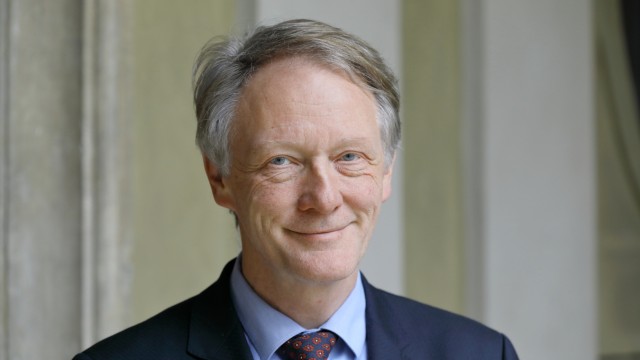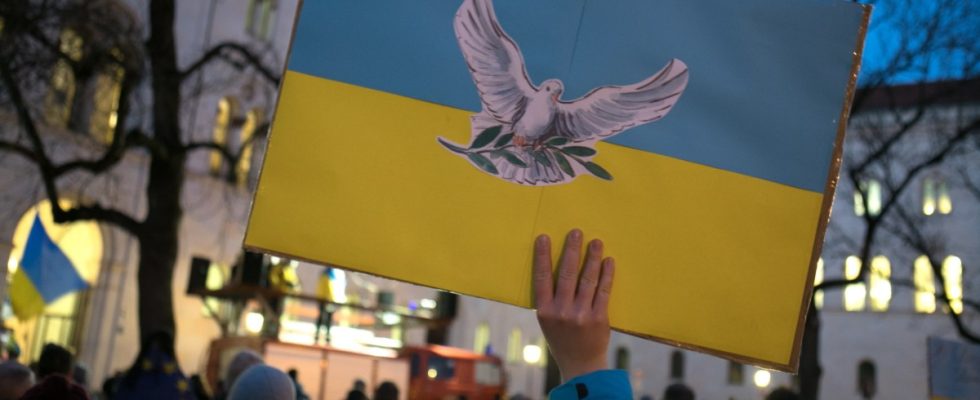It still feels surreal, says Iryna Klymenko. Even though the Russian war of aggression against their homeland has now lasted almost two years. Even though she regularly visits her family in Lviv and hardly a night goes by without a rocket alarm. Every time, says the historian, they would then think: should we wake up the four- and six-year-old nephews or let them sleep? Such existential questions concern them there. Back in Munich, she tries to make progress with her habilitation thesis. And to ignore the war, at least for a few hours.
Iryna Klymenko teaches at the Ludwig Maximilian University (LMU), focusing on early modern European history as the history of the intertwining of “East” and “West”. She puts the terms in quotation marks because she is convinced that this division, which dates back to the Cold War and remains in German school textbooks to this day, is misleading and does not do justice to the complexity of history.
Iryna Klymenko researches the historical connections between Eastern and Western Europe.
(Photo: Robert Haas)
Born in Ukraine in 1981, she came to Munich at the age of 25. She earned her doctorate in German and, in addition to her mother tongue Ukrainian, also speaks English, Polish, Russian, and she speaks Yiddish, Latin and ancient Hebrew. When she arrived in Germany, she realized that Ukraine hardly existed in the academic world, even in history. “And now,” she says, “suddenly everyone is Ukraine experts and wears blue and yellow chains.”
However, a lot has changed at LMU since then. This is mainly thanks to Martin Schulze Wessel, who holds the chair for the history of Eastern and Southeastern Europe. In 2015, shortly after the Russian annexation of Crimea, he founded the German-Ukrainian Historical Commission to deepen connections and promote young academics. 20 years ago, together with colleagues from the University of Regensburg, he launched the elite Eastern European Studies course. It is supported by the Bavarian Elite Network and is still a successful project today. He admits that he would never have dreamed that they would celebrate the anniversary in 2023 under the signs of war.

Martin Schulze Wessel heads the chair for the history of Eastern and Southeastern Europe at the Ludwig Maximilians University and founded the German-Ukrainian Historical Commission.
(Photo: private)
Europe looked different back then. Hopes are focused on growing closer together, says the professor. Russian and Ukrainian students came to Munich – alongside those from other Eastern and Southeast European countries. Conversely, Munich students went to Moscow, Petersburg, Kiev or Lviv. But since February 2022, the focus at the History Seminar has shifted.
The connections to Russia were cut after Putin’s attack on Ukraine, explains Schulze Wessel, like at all German universities. “If we continued to keep in touch, even if only informally, we would also endanger our Russian colleagues.” Because everyone with contacts with the West is now under suspicion in Russia.
Schulze Wessel studied in Moscow in the 1980s and later received his doctorate there. He has Russian friends. “Most of them are now in the West,” he says, “others have retreated into internal emigration.” But there are also individuals who have committed themselves to the mainstream and, over time, turned to orthodox, national issues.
In order to help those who are in danger because they do not want to adapt, the historian is involved in a program that provides fellowships for scientists who are politically persecuted or who are actively committed to the free exchange of knowledge Science College in Berlin and The New Institute in Hamburg. “It’s a drop in the ocean, but it’s a big help for the individual.”
While cooperation with Russian universities came to a standstill, contacts with Ukraine were intensified. “Shortly after the start of the war of aggression, colleagues at the History Seminar set up an aid fund. We were able to provide around 30 female scientists in Munich with scholarships and apartments or pass them on to other institutions,” says Schulze Wessel. In this way, new research networks are also created.
The famous literary scholar Tamara Hundorova, a member of the Ukrainian Academy of Sciences, moved from Munich to Princeton. Historian Natalia Kovalchuk is working at the LMU History Department to “illuminate the idea of Russia’s missionary role within the framework of Pan-Slavism” and is pleased about the Bavarian State Library with its “perfect collection of literature about Eastern Europe.”
Schulze Wessel continues to write applications for annual scholarships to bring Ukrainians – most of them women who are allowed to leave the country – to Munich. “There are students in the seminar who have to study, even though they may have received news of the death of a close relative or friend the day before.” Conversely, students can no longer travel to Ukraine for language stays. “This is painful,” says the professor. “Most people used to stay in the country for a year because our studies are based on mastering the respective language really well.” Now they have to learn Ukrainian in Munich, at least from native speakers.
Schulze Wessel himself was only back in Lviv in October. Iryna Klymenko’s hometown has been characterized by the coexistence of different ethnic groups for centuries: Poles, Jews, Ukrainians, Germans, Armenians, Russians, even Italians and Scots have been drawn to the culturally important city. The center is a world cultural heritage site and its Mediterranean flair has repeatedly served as a film set. However, Schulze Wessel explores a dark chapter in history. Together with Ukrainian colleagues, he launched a long-term research project that will be funded by the federal government with 2.5 million euros in the first four years.
It’s about German-Ukrainian-European history in the last century. Master’s and doctoral theses should primarily deal with the mass violence in the 20th century – from the German and Soviet sides – from which Ukraine suffered: The Holocaust and the Holodomor (the famine catastrophe under Stalin’s rule in 1932/33, which killed millions of people of Ukraine), the crimes of the German Wehrmacht and those of the Russian army. A research center is to be built in Lviv. However, several doctoral students from the Ukrainian cooperation partner in Lviv who could work on the project have volunteered for military service. “We really hope that everyone returns healthy,” says Schulze Wessel.
The historian has made his position on Putin’s war of aggression clear again and again: The Russian autocrat acts less out of rational calculation, but rather follows “historical scripts”https://www.sueddeutsche.de/muenchen/.”His role models are the great tsars like Peter I,” he says. “Anyone who reads Pushkin or Dostoyevsky always encounters this feeling of superiority of the Russian nation. And this still has an effect today, even among the liberal elites.” In his latest book “The Curse of the Empire” (Beck-Verlag), Schulze Wessel explains these connections. “What Germany achieved with great difficulty after 1945, Russia still has to do: turning away from the empire.”
The professor admits that he too had hoped that cooperation in the cultural and scientific fields could be an antidote to Russia’s increasing external aggression and internal repression. “Change through rapprochement – that didn’t achieve anything,” he says today. The government in Berlin did not understand how to read the signals from Moscow. “In German politics, economic interests were at the forefront.”
When Putin published an essay “On the historical unity of Russians and Ukrainians” on the Russian government website in July 2021, Schulze Wessel immediately responded in an essay: This should be understood as a declaration of war. He is convinced that this war is about more than just territorial expansion for Russia, “it is about the destruction of the Ukrainian nation and at the same time about the destabilization of the West.”
Iryna Klymenko will soon travel to Lviv again. It’s depressing, but at least she feels close to her people there, she says. She hopes that one day, when this war is over, a wall will not be built again in people’s minds, here the West, there the East. But that the understanding is also growing in the academic world “that Europe means diversity and that European history can only be thought of in terms of its historical interconnections.”

